介词in的用法
介词in的用法总结
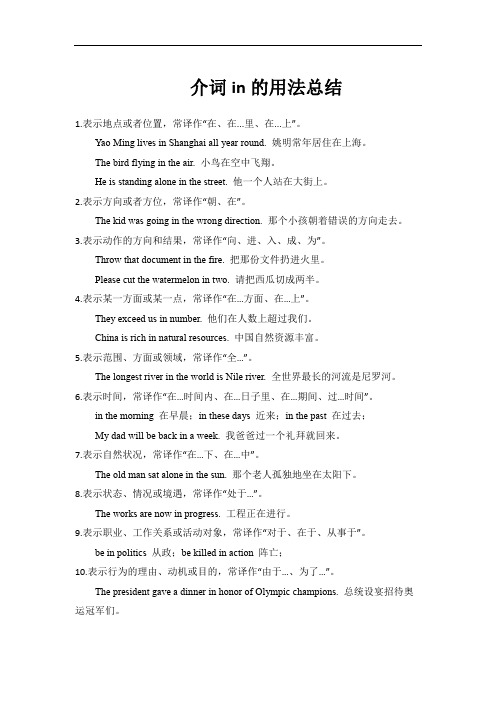
介词in的用法总结1.表示地点或者位置,常译作“在、在...里、在...上”。
Yao Ming lives in Shanghai all year round. 姚明常年居住在上海。
The bird flying in the air. 小鸟在空中飞翔。
He is standing alone in the street. 他一个人站在大街上。
2.表示方向或者方位,常译作“朝、在”。
The kid was going in the wrong direction. 那个小孩朝着错误的方向走去。
3.表示动作的方向和结果,常译作“向、进、入、成、为”。
Throw that document in the fire. 把那份文件扔进火里。
Please cut the watermelon in two. 请把西瓜切成两半。
4.表示某一方面或某一点,常译作“在…方面、在…上”。
They exceed us in number. 他们在人数上超过我们。
China is rich in natural resources. 中国自然资源丰富。
5.表示范围、方面或领域,常译作“全…”。
The longest river in the world is Nile river. 全世界最长的河流是尼罗河。
6.表示时间,常译作“在…时间内、在…日子里、在…期间、过…时间”。
in the morning 在早晨;in these days 近来;in the past 在过去;My dad will be back in a week. 我爸爸过一个礼拜就回来。
7.表示自然状况,常译作“在…下、在…中”。
The old man sat alone in the sun. 那个老人孤独地坐在太阳下。
8.表示状态、情况或境遇,常译作“处于…”。
The works are now in progress. 工程正在进行。
介词in的用法口诀

介词in的用法口诀一、介词in的用法口诀介词是英语中非常重要的语法成分之一,它用于连接名词、代词或动词与其它成分,起到限定、修饰等作用。
其中,介词in是使用频率较高的一个,具有多种不同的用法。
为了更好地掌握和运用这个介词,下面我将为大家总结一些常见的用法,并提供简单易记的口诀。
二、表示位置1. 在某个地点内部:- 例句:The book is in the bag.(这本书在袋子里。
)- 口诀:物在人内每天忙。
2. 在建筑物或城市内部:- 例句:She lives in New York City.(她住在纽约市。
)- 口诀:住在房子城市中。
3. 在公共场所或围墙内:- 例句:We met in the park.(我们在公园里见面。
)- 口诀:遇见好友常公园。
4. 在某个国家、州或地区内部:- 例句:He works in China.(他在中国工作。
)- 口诀:工作旅行选好国。
三、表示时间1. 在具体某一天或日期:- 例句:I have a meeting in June.(我在六月有一个会议。
)- 口诀:几月多添in。
2. 在某一季节或年份:- 例句:She likes to swim in summer.(她喜欢夏天游泳。
)- 口诀:四季全年夏中春。
3. 在某个具体的时间点:- 例句:The train will arrive in ten minutes.(火车将在十分钟内到达。
)- 口诀:最快十分钟到。
四、表示方式1. 在某种情况下或状态中:- 例句:He is always busy in his work.(他工作时总是很忙。
)- 口诀:工作学习用这法。
2. 根据某种计划或安排:- 例句:Let's meet at the restaurant at eight o'clock.(我们八点在餐厅见面吧。
) - 口诀:按计划进行约。
五、表示目的1. 表示进入某种状态或角色:- 例句:She dressed up as a witch in Halloween party.(她在万圣节派对上打扮成巫婆。
in的介词用法
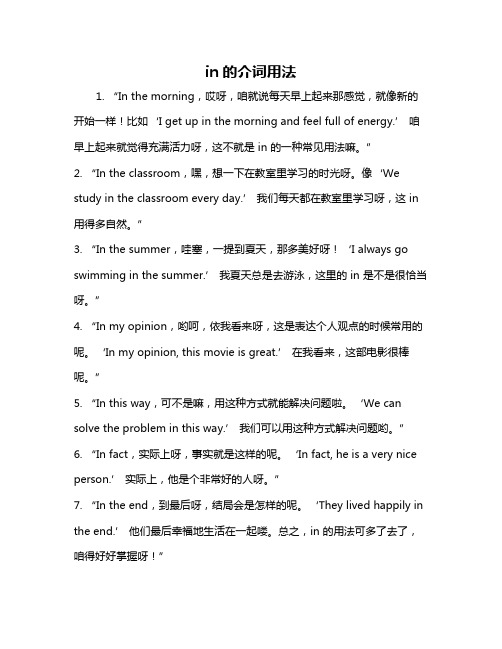
in的介词用法1. “In the morning,哎呀,咱就说每天早上起来那感觉,就像新的开始一样!比如‘I get up in the morning and feel full of energy.’ 咱早上起来就觉得充满活力呀,这不就是 in 的一种常见用法嘛。
”2. “In the classroom,嘿,想一下在教室里学习的时光呀。
像‘We study in the classroom every day.’ 我们每天都在教室里学习呀,这 in 用得多自然。
”3. “In the summer,哇塞,一提到夏天,那多美好呀!‘I always go swimming in the summer.’ 我夏天总是去游泳,这里的 in 是不是很恰当呀。
”4. “In my opinion,哟呵,依我看来呀,这是表达个人观点的时候常用的呢。
‘In my opinion, this movie is great.’ 在我看来,这部电影很棒呢。
”5. “In this way,可不是嘛,用这种方式就能解决问题啦。
‘We can solve the problem in this wa y.’ 我们可以用这种方式解决问题哟。
”6. “In fact,实际上呀,事实就是这样的呢。
‘In fact, he is a very nice person.’ 实际上,他是个非常好的人呀。
”7. “In the end,到最后呀,结局会是怎样的呢。
‘They lived happily in the end.’ 他们最后幸福地生活在一起喽。
总之,in 的用法可多了去了,咱得好好掌握呀!”。
介词In的用法

一、介词In的用法1. in a hurry 匆忙地;in doubt 有疑问,不确定2. in a measure 在某种程度上3. in a sense=in a sort of sense 从某种意义上来说, in this sense, 从这种意义上来说,in my personal sense 依我之见4. in a way 在某种程度上;in a …way 以…方式;in an odd way 以奇怪的方式,奇怪地;in a … fashion=in a … manner 以…方式;in the same way 以同样的方式,就像5. in accord with 与…一致; out of one’s accord with 同…不一致6. in accordance with (=in agreement with=according to) 依照, 根据7. in advance (beforehand) 预告, 事先,提前8. in addition (to) 另外,除…之外9. in all (altogether) 总共, 总计10. in the air 在流行,在传播; 不确定11. in any case 无论如何,总之; in case of (后接短语)假使,万一; in case(后接从句) 假如,以免,万一; in no case 决不12. in blossom 开花(指树木) ; come into blossom 开花(强调动作)13. in brief=in short=in a word(=in as few words as possible)简言之14. in bulk 大批的,不散装的,大宗的15. in charge (of) 负责,主管; in the charge of 由…管理16. in common with 和…有共同点17. in comparison with (=in contrast to) 和…比起来18. in conclusion 最后,总; at the conclusion of 当…结束时19. in/out of condition 健康状况好/不好,in good (bad)condition 处于良好(坏)状态20. in connection with/to 关于,和…有联系21. in consequence 因此,结果;in consequence of 由于…的缘故22. in contrast with/to 与…成对照;与…对比23. in the course of 在…过程中,在…期间24. in danger/trouble 在危险中,垂危25. in debt 欠债26. in details 详细地;in demand 有需求27. in despair 绝望28. in difficulties/trouble 处境困难; in a dilemma 进退两难,左右为难29. in the distance 在远处30. in essence 本质上31. in excess of=more than 超过,过多32. in any event 无论如何;in the event of 万一,如果发生33. in excuse of 作为…的借口34. (be) in existence存在; come into existence 出现35. in the eyes of sb./ in one’s eyes 在某人看来, 在某人眼里36. in fact=in effect =in truth=in reality实际上37. in the face of 面对,不顾38. in fashion时兴, 流行39. in force有效;实施中40. in favo(u)r of 有利于,赞成,支; in one’s favor(=to one’s advantage)对…有利41. in the form of 以…形式42. in front of 在…前面;in a tight corner 陷入困境43. in (the) future 今后,将来;in the near future 在不久将来44. in good faith(=honestly, sincerely) 真诚地45. in general 通常,大体上46. in good taste大方,得体; (反义)in bad taste47. in hand 在掌握中,在控制中48. in half 成两半;in itself 本身49. in honor of 以纪念,向…表示敬意50. in the least 一点,丝毫52. be in the habit of 习惯于53. in the grips/hands of/with 由…掌握, 控制, 负责54. in the light of (=considering; taking into account) 考虑到, 根据55. in line 成一直线,排成一行; in line with 与…一致,按照56. in the long run 最终,从长远观点看;In the short run 从短期来说57. in the mood for 有情绪去做, 有心境做58. in a mess 乱七八糟, 处境困难59. in nature 本质上;In the nature of 属于….性质60. in a moment 立刻,马上61. in memory of 纪念62. in one’s opinion 按某人的看法63. in sight 被看到,看得见64. in spite of 不管,不顾;尽管,虽然65. in step 同步,合拍;步伐一致; out of step 步伐不齐66. in stock 现有,备有67. in sum 总而言之68. in secret 秘密地,私下地;in public 公开地,当众;in private 私下里69. in shape 处于良好状态70. in tears 流着泪,含泪,哭71. in terms of 依据,按照;用…措词72. in return 作为报答,作为回报; in turn 反过来,按顺序73. in practice 在实际中,实践中;in theory 理论上74. in proportion to 与…成比例75. in a position of=be able to 设身处地去,能够做到76. in question 正在讨论,有问题的;in dispute 有争议的77. in order 秩序井然,整齐; in order to 以便, 为了; in order that 以便78. in particular 特别地,尤其,详细地; in part 部分地79. in the past 在过去,以往80. in person 亲自, 当面; in principle 原则上81. in place 在适当的位置,得体,合适82. in place of 代替83. in the first place 起初,首先;in the last place 最后84. in no time 马上85. in the twinkling of an eye 一眨眼, 转眼间86. in search of 寻找; in the hope of希望,期待; in pursuit of 为…追求; in/on behalf of为…的利益; in favor/support of 支持87. in sequence 按顺序, 按先后次序88. in short (=in a few words, in brief)简称, in short supply 供应不足89. be in touch with 与…有接触, 有联系; be out of touch with与…没有联系或接触90. in time(for) 及时;on time (=punctually) 准时91. in that 因为,就在于92. in the wake of 在…之后; in the company of 伴随着93. in the way of 关于…方面94. in this regard 在这一点上,关于这一点95. in total (=all have been added up) 总计96. in vain (=uselessly) 徒劳地97. in view of (=considering) 考虑到; in the view of 按…的意思98. in a word总之; in other words换言之99. in the vicinity 在附近; in close vicinity to 在靠近…的地方; in the vicinity of 大约; in theorder of 大约100. in vogue 正时兴,在流行101. in need of 需要,badly in need of 急需102. in the extreme 极其。
介词in的用法汇总

介词“in”的用法1: 年、月、年月、季节、周即在"来年",在"某月",在"某年某月" (但在某年某月某日则用on),在四季,在第几周等都要用in。
例;in 1986 在1986年in 1927 在1927年in April 在四月in March 在三月in December 1986 1986年12月in July l983 1983年7月in spring 在春季 in summer 在夏季in autumn 在秋季 in winter 在冬季in the fist week of this semester 这学期的第一周in the third week 在第三周2: 阳光、灯、影、衣、冒 in,即在阳光下,在灯下,在树阴下,穿衣、着装、冒雨等都要用in。
例:Don't read in dim light. 切勿在暗淡的灯光下看书。
They are reviewing their lessons in the bright light. 他们在明亮的灯光下复习功课。
They are sitting in the shade of a tree. 他们坐在树阴下乘凉。
a prisoner in irons带着镣铐的囚犯He went in the rain to meet me at the station. 他冒雨到车站去接我。
The poor dressed (clothed) in rags in old society.旧社会穷人们衣衫褴褛.以及:in the bright sunlight在明亮的阳光下a merchant in disguise 乔装的商人the woman in white (black, red, yellow) 穿着白(黑、红、黄)色衣服的妇女in uniform 穿着制服in mourning 穿着丧服in brown shoes 穿着棕色鞋in his shirt sleeves 穿着衬衫3: 将来时态in...以后例: They will come back in 10 days. 他们将10天以后回来。
总结介词in的用法
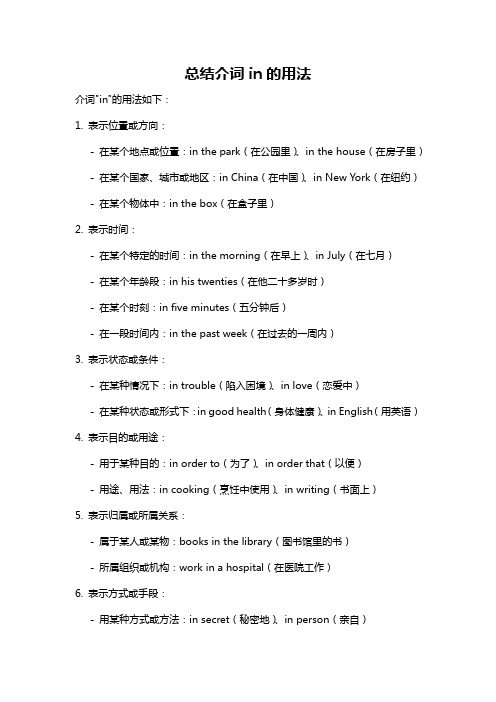
总结介词in的用法介词"in"的用法如下:1. 表示位置或方向:- 在某个地点或位置:in the park(在公园里)、in the house(在房子里)- 在某个国家、城市或地区:in China(在中国)、in New York(在纽约)- 在某个物体中:in the box(在盒子里)2. 表示时间:- 在某个特定的时间:in the morning(在早上)、in July(在七月)- 在某个年龄段:in his twenties(在他二十多岁时)- 在某个时刻:in five minutes(五分钟后)- 在一段时间内:in the past week(在过去的一周内)3. 表示状态或条件:- 在某种情况下:in trouble(陷入困境)、in love(恋爱中)- 在某种状态或形式下:in good health(身体健康)、in English(用英语)4. 表示目的或用途:- 用于某种目的:in order to(为了)、in order that(以便)- 用途、用法:in cooking(烹饪中使用)、in writing(书面上)5. 表示归属或所属关系:- 属于某人或某物:books in the library(图书馆里的书)- 所属组织或机构:work in a hospital(在医院工作)6. 表示方式或手段:- 用某种方式或方法:in secret(秘密地)、in person(亲自)- 走某个路径或通过某个方式:send it in the mail(通过邮寄发送)7. 其他用法:- 表示传统或情境:in China, people eat dumplings on Chinese New Year.(在中国,人们在中国农历新年吃饺子。
)- 表示限制或范围:in this case(在这种情况下)、in my opinion(在我看来)总之,介词"in"的用法多种多样,可以表示位置、时间、状态、目的、归属等各种关系和概念。
in的用法小结
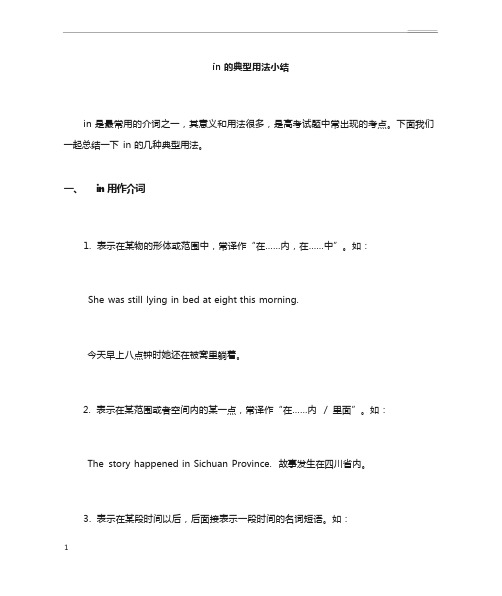
in的典型用法小结in 是最常用的介词之一,其意义和用法很多,是高考试题中常出现的考点。
下面我们一起总结一下in 的几种典型用法。
一、in用作介词1. 表示在某物的形体或范围中,常译作“在……内,在……中”。
如:She was still lying in bed at eight this morning.今天早上八点钟时她还在被窝里躺着。
2. 表示在某范围或者空间内的某一点,常译作“在……内 / 里面”。
如:The story happened in Sichuan Province. 故事发生在四川省内。
3. 表示在某段时间以后,后面接表示一段时间的名词短语。
如:Mom will be well again in three weeks’ time.妈妈三周后就会好的。
4. 表示穿着,戴着。
如:The lady in white was in charge of the company.那位白衣女子掌管着这家公司。
5. 表示某事的形式、形状、安排或数量。
如:When new school year begins, the students come to school in twos and threes.新学期开始了,学生们三三两两地来到学校。
6. 表示所使用的语言、材料等。
如:Please write the composition in blue ink. 请用蓝色墨水写作文。
7. 表示关于……;在……方面。
如:The street was twenty metres in width.街道宽二十米。
That was a small country rich in oil. 那是个富有石油的小国家。
二、in用作副词1. 表示进入。
如:You shouldn’t let anyone in if they can’t show their pass.没通行证谁也不能进入。
2. 表示在家或在工作单位。
in的用法及短语 (2)

in的用法及短语In是一个常见的英语介词,具有多种用法和短语。
本文将详细介绍in的各种用法以及相应的短语。
一、表示位置或地点1. in + 地名(城市、国家等):例如,I live in New York.(我住在纽约。
)2. in + 房间、建筑物等:例如,There is a computer in the office.(办公室里有一台电脑。
)3. in the middle/center:例如,She sat in the middle of the room.(她坐在房间中间。
)二、表示时间或期限1. in + 年份/季节/月份:例如,We will travel to Tokyo in December.(我们会在12月去东京旅行。
)2. in the morning/afternoon/evening:例如,I have a meeting in the afternoon.(下午我有个会议。
)3. in + 多长时间后:例如,He will be back in 30 minutes.(他将在30分钟后回来。
)三、表示状态或情况1. be in + 情感/状态:例如,He is always in a good mood.(他总是心情很好。
)2. be in trouble/difficulty/danger等困境中:例如,在文化差异中工作可能会遇到困难。
(Working within cultural differences can be challenging.)四、表示方式或手段1. do something in a certain way:例如,She can solve the problem in her own way.(她可以用自己的方法解决问题。
)2. communicate/talk in English/French等:例如,They spoke to each other in French.(他们用法语互相交谈。
in的用法及区别
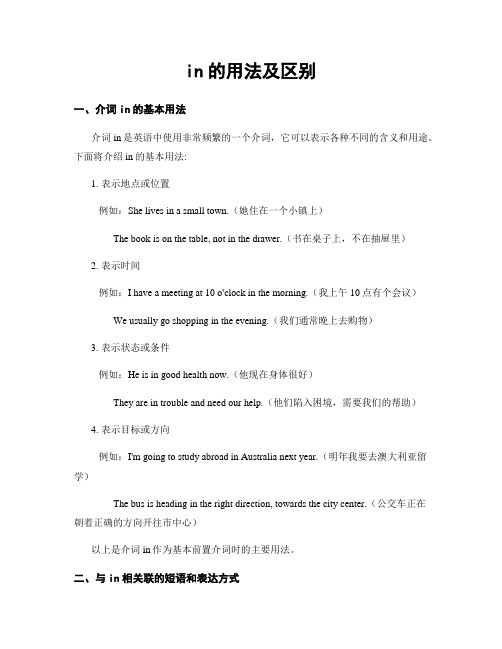
in的用法及区别一、介词in的基本用法介词in是英语中使用非常频繁的一个介词,它可以表示各种不同的含义和用途。
下面将介绍in的基本用法:1. 表示地点或位置例如:She lives in a small town.(她住在一个小镇上)The book is on the table, not in the drawer.(书在桌子上,不在抽屉里)2. 表示时间例如:I have a meeting at 10 o'clock in the morning.(我上午10点有个会议)We usually go shopping in the evening.(我们通常晚上去购物)3. 表示状态或条件例如:He is in good health now.(他现在身体很好)They are in trouble and need our help.(他们陷入困境,需要我们的帮助)4. 表示目标或方向例如:I'm going to study abroad in Australia next year.(明年我要去澳大利亚留学)The bus is heading in the right direction, towards the city center.(公交车正在朝着正确的方向开往市中心)以上是介词in作为基本前置介词时的主要用法。
二、与in相关联的短语和表达方式1. be interested in这个短语表示对某事感兴趣的意思。
例如:She is interested in learning new languages.(她对学习新语言很感兴趣)2. be involved in这个短语表示参与某种活动或事情。
例如:He is involved in a charity campaign to help those in need.(他参与了一项慈善活动,帮助那些有需要的人)3. result in这个短语表示导致某种结果。
介词in的用法及例子
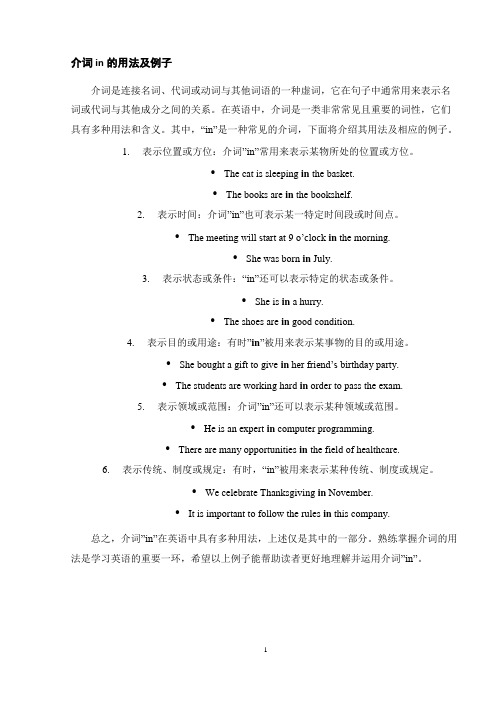
介词in的用法及例子介词是连接名词、代词或动词与其他词语的一种虚词,它在句子中通常用来表示名词或代词与其他成分之间的关系。
在英语中,介词是一类非常常见且重要的词性,它们具有多种用法和含义。
其中,“in”是一种常见的介词,下面将介绍其用法及相应的例子。
1.表示位置或方位:介词”in”常用来表示某物所处的位置或方位。
•The cat is sleeping in the basket.•The books are in the bookshelf.2.表示时间:介词”in”也可表示某一特定时间段或时间点。
•The meeting will start at 9 o’clock in the morning.•She was born in July.3.表示状态或条件:“in”还可以表示特定的状态或条件。
•She is in a hurry.•The shoes are in good condition.4.表示目的或用途:有时”in”被用来表示某事物的目的或用途。
•She bought a gift to give in her friend’s birthday party.•The students are working hard in order to pass the exam.5.表示领域或范围:介词”in”还可以表示某种领域或范围。
•He is an expert in computer programming.•There are many opportunities in the field of healthcare.6.表示传统、制度或规定:有时,“in”被用来表示某种传统、制度或规定。
•We celebrate Thanksgiving in November.•It is important to follow the rules in this company.总之,介词”in”在英语中具有多种用法,上述仅是其中的一部分。
地点介词in的用法
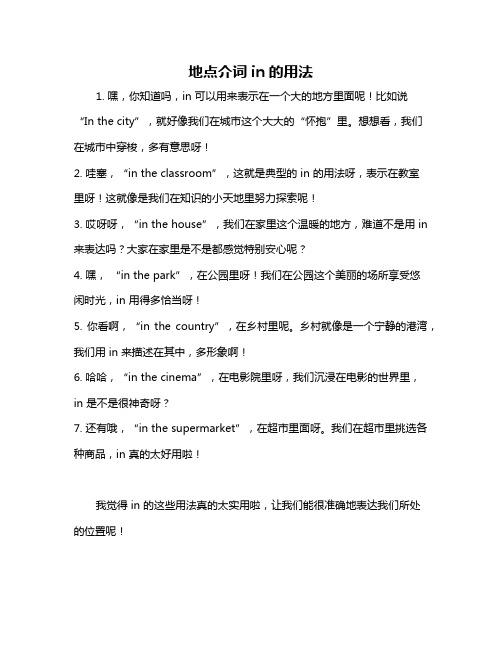
地点介词in的用法
1. 嘿,你知道吗,in 可以用来表示在一个大的地方里面呢!比如说
“In the city”,就好像我们在城市这个大大的“怀抱”里。
想想看,我们
在城市中穿梭,多有意思呀!
2. 哇塞,“in the classroom”,这就是典型的 in 的用法呀,表示在教室
里呀!这就像是我们在知识的小天地里努力探索呢!
3. 哎呀呀,“in the house”,我们在家里这个温暖的地方,难道不是用 in 来表达吗?大家在家里是不是都感觉特别安心呢?
4. 嘿,“in the park”,在公园里呀!我们在公园这个美丽的场所享受悠
闲时光,in 用得多恰当呀!
5. 你看啊,“in the country”,在乡村里呢。
乡村就像是一个宁静的港湾,我们用 in 来描述在其中,多形象啊!
6. 哈哈,“in the cinema”,在电影院里呀,我们沉浸在电影的世界里,
in 是不是很神奇呀?
7. 还有哦,“in the supermarket”,在超市里面呀。
我们在超市里挑选各种商品,in 真的太好用啦!
我觉得 in 的这些用法真的太实用啦,让我们能很准确地表达我们所处
的位置呢!。
in 的用法总结
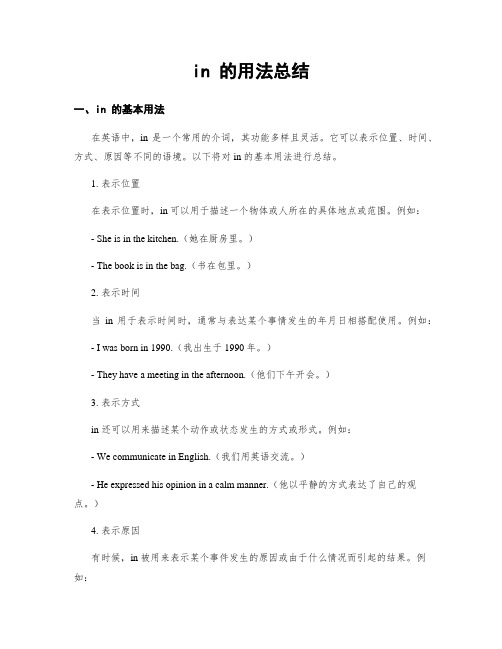
in 的用法总结一、in 的基本用法在英语中,in 是一个常用的介词,其功能多样且灵活。
它可以表示位置、时间、方式、原因等不同的语境。
以下将对 in 的基本用法进行总结。
1. 表示位置在表示位置时,in 可以用于描述一个物体或人所在的具体地点或范围。
例如:- She is in the kitchen.(她在厨房里。
)- The book is in the bag.(书在包里。
)2. 表示时间当in 用于表示时间时,通常与表达某个事情发生的年月日相搭配使用。
例如:- I was born in 1990.(我出生于1990年。
)- They have a meeting in the afternoon.(他们下午开会。
)3. 表示方式in 还可以用来描述某个动作或状态发生的方式或形式。
例如:- We communicate in English.(我们用英语交流。
)- He expressed his opinion in a calm manner.(他以平静的方式表达了自己的观点。
)4. 表示原因有时候,in 被用来表示某个事件发生的原因或由于什么情况而引起的结果。
例如:- She burst into tears in frustration.(她因为沮丧而放声痛哭起来。
)- In his absence, we had to make the decision ourselves.(由于他不在,我们不得不自己做出决定。
)二、in 在短语中的用法除了基本的用法外,in 还在一些常用的短语中发挥特殊作用。
下面将介绍几个典型的例子。
1. in addition(此外)这个短语表示“除此之外还有”的意思,用于对已经提到的事物进行补充。
例如:- The book is well-written, and in addition, it has beautiful illustrations.(这本书写得很好,并且此外还有美丽的插图。
in的用法归纳总结
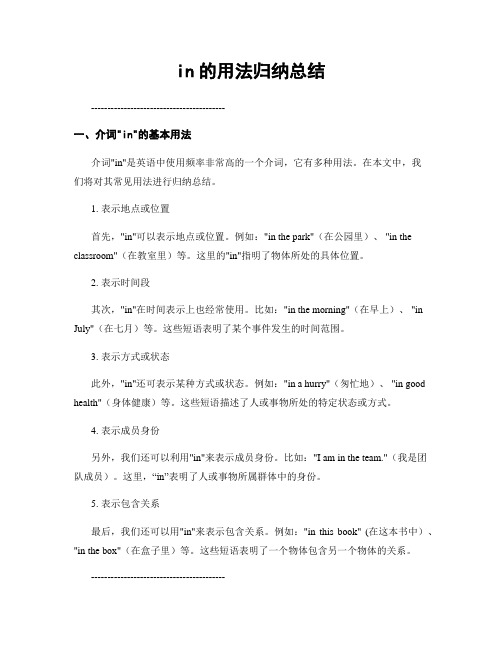
in的用法归纳总结-----------------------------------------一、介词"in"的基本用法介词"in"是英语中使用频率非常高的一个介词,它有多种用法。
在本文中,我们将对其常见用法进行归纳总结。
1. 表示地点或位置首先,"in"可以表示地点或位置。
例如:"in the park"(在公园里)、 "in the classroom"(在教室里)等。
这里的"in"指明了物体所处的具体位置。
2. 表示时间段其次,"in"在时间表示上也经常使用。
比如:"in the morning"(在早上)、 "in July"(在七月)等。
这些短语表明了某个事件发生的时间范围。
3. 表示方式或状态此外,"in"还可表示某种方式或状态。
例如:"in a hurry"(匆忙地)、 "in good health"(身体健康)等。
这些短语描述了人或事物所处的特定状态或方式。
4. 表示成员身份另外,我们还可以利用"in"来表示成员身份。
比如:"I am in the team."(我是团队成员)。
这里,“in”表明了人或事物所属群体中的身份。
5. 表示包含关系最后,我们还可以用"in"来表示包含关系。
例如:"in this book" (在这本书中)、"in the box"(在盒子里)等。
这些短语表明了一个物体包含另一个物体的关系。
-----------------------------------------二、与“in”相关的常见短语除了上述基本用法外,有一些与“in”相关的常用短语也非常值得我们注意和学习。
介词in的特殊用法大全

介词"in"的特殊用法大全介词"in"在英语中是一个非常常用的词,它不仅可以表示方位和位置,还可以表示时间、领域、状态、方法、目的和行为方式等多种含义。
以下是介词"in"的特殊用法大全,主要包含以下七个方面:1.表示进度:in + 进度名词,表示在某个进度或阶段。
例如:in progress(在进行中)、in development(在开发中)。
2. 表示时间:in + 时间段,表示在某个时间段内。
例如:in the morning(在早上)、in three days(在三天内)。
3. 表示领域:in + 领域名词,表示在某个领域或行业内。
例如:in science (在科学领域内)、in music(在音乐行业中)。
4. 表示状态:in + 状态名词,表示处于某种状态或情况。
例如:in trouble (处于困境中)、in love(在恋爱中)。
5. 表示方法:in + 方法名词,表示使用某种方法或工具。
例如:in English (用英语表达)、in words(用语言表达)。
当“in”用于描述使用或表达的方式时,通常与名词或名词短语一起使用,表示使用某种工具、语言或方法。
1). 表示使用工具或媒介in writing (书面形式)in English (用英语)in cash (用现金)2). 表示表达方式in words (用语言表达)in simple terms (简而言之)in detail (详细地)3.)表示艺术形式或风格in poetry (以诗歌的形式)in prose (以散文的形式)in paint (以绘画的形式)4). 表示方法或手段in this way (以这种方式)in the modern sense (按照现代的意义)in a unique style (以独特的风格)5). 固定搭配除了上述用法,还有一些固定搭配,如“in public”(在公共场合)、“in private”(私下地)等。
介词in的用法
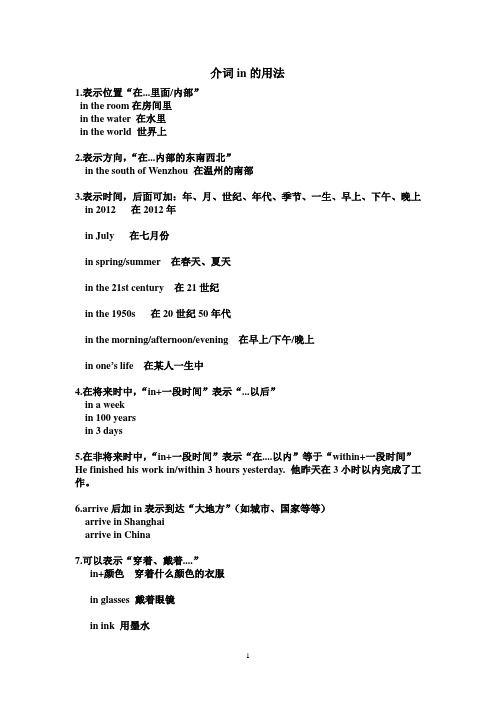
介词in的用法1.表示位置“在...里面/内部”in the room在房间里in the water 在水里in the world 世界上2.表示方向,“在...内部的东南西北”in the south of Wenzhou 在温州的南部3.表示时间,后面可加:年、月、世纪、年代、季节、一生、早上、下午、晚上in 2012 在2012年in July 在七月份in spring/summer 在春天、夏天in the 21st century 在21世纪in the 1950s 在20世纪50年代in the morning/afternoon/evening 在早上/下午/晚上in one’s life 在某人一生中4.在将来时中,“in+一段时间”表示“...以后”in a weekin 100 yearsin 3 days5.在非将来时中,“in+一段时间”表示“在....以内”等于“within+一段时间”He finished his work in/within 3 hours yesterday. 他昨天在3小时以内完成了工作。
6.arrive后加in表示到达“大地方”(如城市、国家等等)arrive in Shanghaiarrive in China7.可以表示“穿着、戴着....”in+颜色穿着什么颜色的衣服in glasses 戴着眼镜in ink 用墨水in this/that way 用这种/那种方法8.表示“用,以”in+语言用某种语言in cash 用现金(支付)9.表比率,“数字+in+数字”表示“几分之几”或“百分之”one in ten 十分之一/百分之十four in five 五分之四10.表示状态、状况in good health/condition 身体很好in danger 处于危险中、濒临灭绝中in trouble 处于困境中10.与in搭配的形容词、动词短语be interested in +n/doing 对...感兴趣be busy (in) doing 忙于做某事be rich in + n. 富含... 盛产...do well in + n./doing 擅长....have trouble/difficulty (in) doing 做某事有困难be successful in+n./doing 在某方面很成功be confident in sb 对某人有信心be weak/poor in +n./doing 在...方面不行/在...方面很差造句:1.我的英语口语很差。
介词in的用法
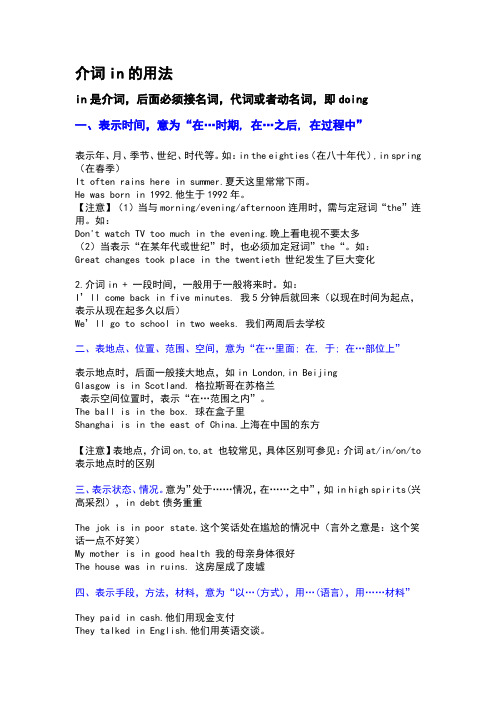
介词in的用法in是介词,后面必须接名词,代词或者动名词,即doing一、表示时间,意为“在…时期, 在…之后, 在过程中”表示年、月、季节、世纪、时代等。
如:in the eighties(在八十年代),in spring (在春季)It often rains here in summer.夏天这里常常下雨。
He was born in 1992.他生于1992年。
【注意】(1)当与morning/evening/afternoon连用时,需与定冠词“the”连用。
如:Don't watch TV too much in the evening.晚上看电视不要太多(2)当表示“在某年代或世纪”时,也必须加定冠词”the“。
如:Great changes took place in the twentieth 世纪发生了巨大变化2.介词in + 一段时间,一般用于一般将来时。
如:I’ll come back in five minutes. 我5分钟后就回来(以现在时间为起点,表示从现在起多久以后)We’ll go to school in two weeks. 我们两周后去学校二、表地点、位置、范围、空间,意为“在…里面; 在, 于; 在…部位上”表示地点时,后面一般接大地点,如in London,in BeijingGlasgow is in Scotland. 格拉斯哥在苏格兰表示空间位置时,表示“在…范围之内”。
The ball is in the box. 球在盒子里Shanghai is in the east of China.上海在中国的东方【注意】表地点,介词on,to,at 也较常见,具体区别可参见:介词at/in/on/to 表示地点时的区别三、表示状态、情况。
意为”处于……情况,在……之中”,如in high spirits(兴高采烈),in debt债务重重The jok is in poor state.这个笑话处在尴尬的情况中(言外之意是:这个笑话一点不好笑)My mother is in good health 我的母亲身体很好The house was in ruins. 这房屋成了废墟四、表示手段,方法,材料,意为“以…(方式),用…(语言),用……材料”They paid in cash.他们用现金支付They talked in English.他们用英语交谈。
in的用法归纳总结
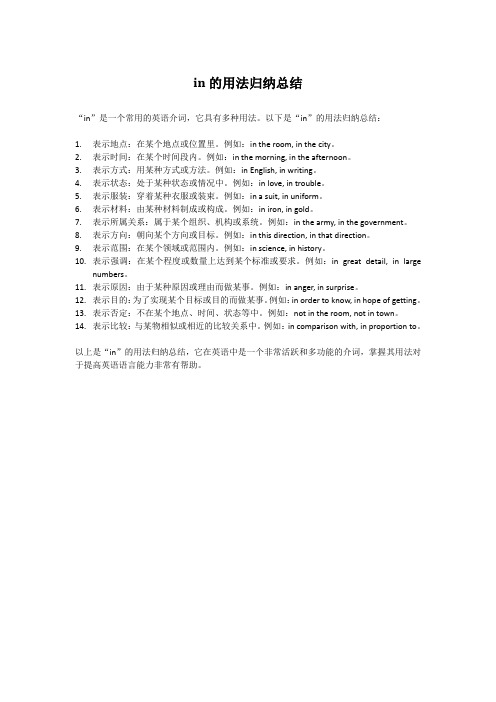
in的用法归纳总结“in”是一个常用的英语介词,它具有多种用法。
以下是“in”的用法归纳总结:1.表示地点:在某个地点或位置里。
例如:in the room, in the city。
2.表示时间:在某个时间段内。
例如:in the morning, in the afternoon。
3.表示方式:用某种方式或方法。
例如:in English, in writing。
4.表示状态:处于某种状态或情况中。
例如:in love, in trouble。
5.表示服装:穿着某种衣服或装束。
例如:in a suit, in uniform。
6.表示材料:由某种材料制成或构成。
例如:in iron, in gold。
7.表示所属关系:属于某个组织、机构或系统。
例如:in the army, in the government。
8.表示方向:朝向某个方向或目标。
例如:in this direction, in that direction。
9.表示范围:在某个领域或范围内。
例如:in science, in history。
10.表示强调:在某个程度或数量上达到某个标准或要求。
例如:in great detail, in largenumbers。
11.表示原因:由于某种原因或理由而做某事。
例如:in anger, in surprise。
12.表示目的:为了实现某个目标或目的而做某事。
例如:in order to know, in hope of getting。
13.表示否定:不在某个地点、时间、状态等中。
例如:not in the room, not in town。
14.表示比较:与某物相似或相近的比较关系中。
例如:in comparison with, in proportion to。
以上是“in”的用法归纳总结,它在英语中是一个非常活跃和多功能的介词,掌握其用法对于提高英语语言能力非常有帮助。
介词in的用法及例子
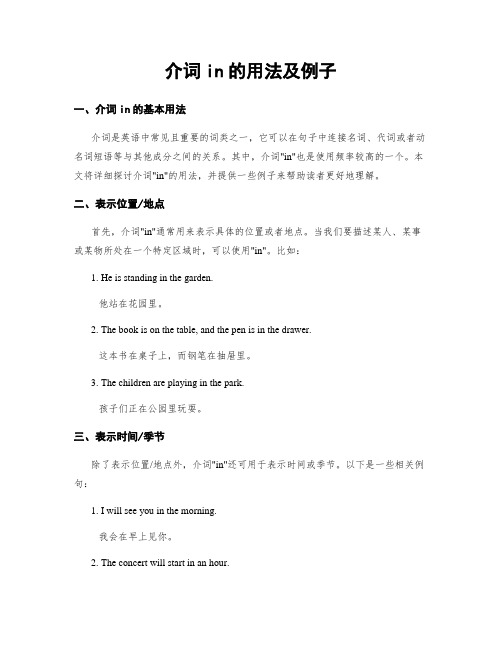
介词in的用法及例子一、介词in的基本用法介词是英语中常见且重要的词类之一,它可以在句子中连接名词、代词或者动名词短语等与其他成分之间的关系。
其中,介词"in"也是使用频率较高的一个。
本文将详细探讨介词"in"的用法,并提供一些例子来帮助读者更好地理解。
二、表示位置/地点首先,介词"in"通常用来表示具体的位置或者地点。
当我们要描述某人、某事或某物所处在一个特定区域时,可以使用"in"。
比如:1. He is standing in the garden.他站在花园里。
2. The book is on the table, and the pen is in the drawer.这本书在桌子上,而钢笔在抽屉里。
3. The children are playing in the park.孩子们正在公园里玩耍。
三、表示时间/季节除了表示位置/地点外,介词"in"还可用于表示时间或季节。
以下是一些相关例句:1. I will see you in the morning.我会在早上见你。
2. The concert will start in an hour.音乐会将在一个小时后开始。
3. We always go skiing in winter.我们总是冬天去滑雪。
四、表示容器/包含关系此外,介词"in"还可以用来表示容器或者包含关系。
例如:1. She keeps her jewelry in a small box.她把珠宝放在一个小盒子里。
2. The water bottle is in my backpack.水瓶在我的背包里。
3. There are many books in the library.图书馆里有很多书。
五、表示语言/领域除了以上几种用法,介词"in"还可以用来表达使用的语言或者所属的领域。
in的三种用法
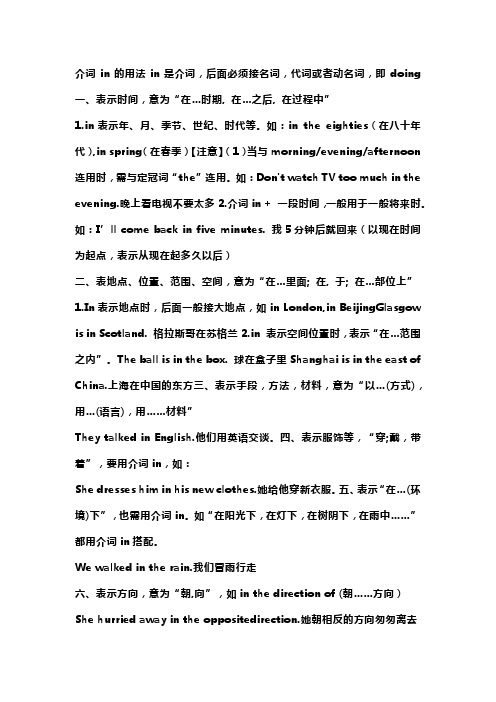
介词in的用法in是介词,后面必须接名词,代词或者动名词,即doing一、表示时间,意为“在…时期, 在…之后, 在过程中”1.in表示年、月、季节、世纪、时代等。
如:in the eighties(在八十年代),in spring(在春季)【注意】(1)当与morning/evening/afternoon 连用时,需与定冠词“the”连用。
如:Don't watch TV too much in the evening.晚上看电视不要太多2.介词in + 一段时间,一般用于一般将来时。
如:I’ll come back in five minutes. 我5分钟后就回来(以现在时间为起点,表示从现在起多久以后)二、表地点、位置、范围、空间,意为“在…里面; 在, 于; 在…部位上”1.In表示地点时,后面一般接大地点,如in London,in BeijingGlasgow is in Scotland. 格拉斯哥在苏格兰2.in 表示空间位置时,表示“在…范围之内”。
The ball is in the box. 球在盒子里Shanghai is in the east of China.上海在中国的东方三、表示手段,方法,材料,意为“以…(方式),用…(语言),用……材料”They talked in English.他们用英语交谈。
四、表示服饰等,“穿;戴,带着”,要用介词in,如:She dresses him in his new clothes.她给他穿新衣服。
五、表示“在…(环境)下”,也需用介词in。
如“在阳光下,在灯下,在树阴下,在雨中……”都用介词in搭配。
We walked in the rain.我们冒雨行走六、表示方向,意为“朝,向”,如in the direction of (朝……方向)She hurried away in the oppositedirection.她朝相反的方向匆匆离去七、表示数量、程度、比例,意为“按,以;在...中”,如in large numbers(数量极大的)One child in twenty has this disease.二十个小孩中有一个患有这种疾病。
- 1、下载文档前请自行甄别文档内容的完整性,平台不提供额外的编辑、内容补充、找答案等附加服务。
- 2、"仅部分预览"的文档,不可在线预览部分如存在完整性等问题,可反馈申请退款(可完整预览的文档不适用该条件!)。
- 3、如文档侵犯您的权益,请联系客服反馈,我们会尽快为您处理(人工客服工作时间:9:00-18:30)。
介词in的用法in是介词,后面必须接名词,代词或者动名词,即doing一、表示时间,意为“在…时期,在…之后,在过程中”1.in表示年、月、季节、世纪、时代等。
如:in the eighties(在八十年代),in spring(在春季)It often rains here in summer.夏天这里常常下雨。
He was born in1992.他生于1992年。
【注意】(1)当与morning/evening/afternoon连用时,需与定冠词“the”连用。
如:Don't watch TV too much in the evening.晚上看电视不要太多(2)当表示“在某年代或世纪”时,也必须加定冠词”the“。
如:Great changes took place in the twentieth century.20世纪发生了巨大变化2.介词in+一段时间,一般用于一般将来时。
如:I’ll come back in five minutes.我5分钟后就回来(以现在时间为起点,表示从现在起多久以后)We’ll go to school in two weeks.我们两周后去学校二、表地点、位置、范围、空间,意为“在…里面;在,于;在…部位上”1.In表示地点时,后面一般接大地点,如in London,in BeijingGlasgow is in Scotland.格拉斯哥在苏格兰2.in表示空间位置时,表示“在…范围之内”。
The ball is in the box.球在盒子里Shanghai is in the east of China.上海在中国的东方【注意】表地点,介词on,to,at也较常见,具体区别可参见:介词at/in/on/to表示地点时的区别三、表示状态、情况。
意为”处于……情况,在……之中”,如in high spirits(兴高采烈),in debt债务重重The jok is in poor state.这个笑话处在尴尬的情况中(言外之意是:这个笑话一点不好笑)My mother is in good health我的母亲身体很好The house was in ruins.这房屋成了废墟四、表示手段,方法,材料,意为“以…(方式),用…(语言),用……材料”They paid in cash.他们用现金支付They talked in English.他们用英语交谈。
Please write in pencil,not in ink.请用铅笔写,不要用钢笔写。
The letter was written in French.信是用法文写的。
【注意】(1)in表示材料时,前面不用冠词,如draw in pencial,而with指用工具时,一定要加冠词,如draw with a pencial.(2)介词of和form也可以表示材料,of表示成品时仍可看出原材料,from表示成品时已看不出原材料,in则强调用材料,如:This box is made of paper这个盒子是用纸做的Wine is made from grapes葡萄酒是用葡萄酿造的Fill in the form in black color pen请用黑色水笔填写表格五、表示服饰等,“穿;戴,带着”,要用介词in,如:The policeman is in uniform.警察穿着制服。
She dresses him in his new clothes.她给他穿新衣服。
六、表示“在…(环境)下”,也需用介词in。
如“在阳光下,在灯下,在树阴下,在雨中……”都用介词in搭配。
We walked in the rain.我们冒雨行走They are playing in the shade of a tree.他们坐在树阴下玩耍Don't write in dim light.切勿在暗淡的灯光下写字The trees are growing in the bright sunlight那些树在明亮的阳光下成长。
七、表示职业,活动,意为“从事(职业);参加(活动)”He's in the army.他在军队里She is in business.她做生意八、表示方向,意为“朝,向”,如in the direction of(朝……方向)She hurried away in the opposite direction.她朝相反的方向匆匆离去九、表示目的,意为“为了……,除了……”一般结构为“in+名词+介词短语或不定式短语”We are in favor of the plan我们支持这项计划。
A part was held in honor of the president为了庆祝总统,我们专门举行了这场宴会。
In addition to the names on the list,there are also six other application除了名单上的名字,另外还有6份申请。
十、表示数量、程度、比例,意为“按,以;在...中”,如in large numbers(数量极大的)One child in twenty has this disease.二十个小孩中有一个患有这种疾病in介词prep.1.在...里,在...上The two brothers study in the same class.两兄弟在同一个班里上课。
The telephone is in the little study on the ground floor.电话在一楼的小书房内。
2.在...之内;在...方面He is lacking in courage.他缺乏勇气。
3.从事于;参加着She is in business.她做生意。
4.穿着,戴着He is dressed in black.他穿黑衣服。
5.朝,向She hurried away in the opposite direction.她朝相反的方向匆匆离去。
6.(表示手段、方法、材料)用,以They paid in cash.他们用现金支付。
7.在...期间;在...以后He'll come back in a week.他将于一周之后回来。
I haven't met her in a long time.我好长时间没有遇见她了。
8.处在...中The room was in disorder.房间里乱七八糟。
9.(表示数量、程度、比例)按,以;在...中One child in twenty has this disease.二十个小孩中有一个患有这种疾病。
10.在...身上,在...上In him I see a future leader.我在他身上看到了一个未来的领袖人物。
11.(表示过程)在...当儿;在...过程中The work is in progress.这工作正在进行中。
12.(表示动作的方向和结果)进入到...中;成,为He pushed a button and set the machine in motion.他按下按钮开动了机器。
年月用in,日用on介词at/in/on/to表示地点时的区别介词at/in/on/to表示地点时的区别:at、on、in这三个介词除了表示时间外,还可以表示地点。
下面连同高频词汇to一起讲讲他们用法的一些区别。
at强调点,on强调面,in强调在里面,to则是表示范围外,具体区别如下:at主要用在:(1)at通常指小地方,如:home,school(2)at通常所指范围不太明显,表示“在……附近,旁边”Mrs.Jones is at home Thursdays.琼斯太太每星期四在家接待客人The ball is at the corner.球搁在角落里in主要用在:(1)in通常指大地方,如:London,Beijing(2)在内部;还可以表示“在…范围之内”(是从属关系)I live in a great city big city and my sister lives at a small town我住在大城市,我姐姐住在一个小城镇The ball is in the box.球在盒子里Shenzhen lies in the south of China深圳在中国的南部(深圳属于中国内部)on主要用在:(1)on主要指“在……之上”,强调和表面接触,如on the ground(2)表示毗邻,接壤(是相邻关系)He put his watch on the desk他把手表放在桌子上Canada lies on the north of America加拿大在美国的北边(与美国接壤)【注意】over也可以表示“在......上方”,但是指一物体与另一物体不接触,如:There is a light over the desk.桌子上方有一盏灯(桌子和灯不接触)There is a light on the desk.桌子上有盏台灯。
(桌子与灯接触)to主要用在:(1)to主要表示“在……范围外”,强调不接壤,不相邻;(2)“到达……”Haikou lies to the south of Guangzhou海南在广州的那边(与广州不相邻)I will go to school.我将去学校【活学活用】1.on the tree/in the tree都译为“......在树上”。
他们有什么区别呢?2.on the wall/in the wall都译为“在墙上”,他们又有什么区别呢?答案:1.on the tree表示树上本身所长着的叶子、花、果实等;而in the tree表示某物或某人在树上。
2.on强调”在……表面“,如图画、黑板、风筝等“在墙上”,是因为它们在墙的表面上,所以用on the wall;to强调”在……里面“,如门窗、钉子、洞、孔等“在墙上”,是因为它们在墙的里面,故用in the wall介词to的常见用法to1KK:[]DJ:[]prep.1.向,往,到She lives in the house to the right.她住在右边的房子里。
This road leads to Paris.这条路通往巴黎。
2.(表示距离)离3.(表示时间)直到,在...之前He wrote from morning to night.他从早到晚写东西。
4.(表示程度、范围)到,达He was wet to the skin.他浑身湿透了。
5.趋于;(变)成,(变)到Things are going from bad to worse.情形每况愈下。
